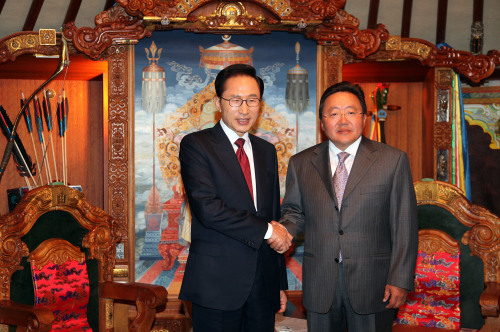President Lee Myung-bak on Monday agreed with Mongolian President Tsakhia Elbegdorj to upgrade the level of bilateral cooperation to a “comprehensive partnership,” portending greater opportunities for Koreans to do business in the mineral-rich country.
In addition to expanding ties in developing energy and natural resources, the two leaders agreed during their summit talks in Ulan Bator to increase personnel exchanges such as regular high-level talks in a bid to bolster diplomatic cooperation on matters of international concern.
In addition to expanding ties in developing energy and natural resources, the two leaders agreed during their summit talks in Ulan Bator to increase personnel exchanges such as regular high-level talks in a bid to bolster diplomatic cooperation on matters of international concern.

The geopolitical importance of Mongolia, which lies between Russia and China, and its abundant natural resources have already attracted the governments and companies of the United States, the European Union and Japan as well as its neighbors to the emerging market.
“Mongolia has one of the world’s largest reserves of radioactive minerals such as uranium and rare-earth elements, copper, molybdenum, gold and coal,” Lee’s spokesman Park Jeong-ha said.
The two leaders adopted a joint statement and a “mid-term action plan,” which calls for expanding Korea’s investment in Mongolia’s infrastructure and construction sectors, including Korean firms’ participation in a project to build 100,000 apartment units.
The two sides also agreed to set up a joint resources and energy commission to promote joint development of mineral resources.
Under the plan for greater political, diplomatic and economic partnership, Korea and Mongolia will hold annual foreign ministerial talks and increase exchanges between lawmakers and high-level officials.
Korea agreed to positively consider Mongolia’s ascension to the Asia-Pacific Economic Cooperation forum, and Mongolia expressed its willingness to join the East Asia Summit, the joint statement said.
After the summit, the two countries signed agreements to increase cooperation in the fields of health care and mineral resources.
Korea’s Ministry of Knowledge Economy and its Mongolian counterpart signed a preliminary deal to beef up technological exchanges for thermal power generation, development of renewable energy and eco-friendly fuels, joint projects for climate control and natural resource exploration.
Their health ministries agreed to promote development cooperation to help Korean medical institutions make inroads into Mongolia and improve the country’s medical services.
Mongolia welcomed South Korea’s recent talks with North Korea in Bali, Indonesia, and supported Seoul’s efforts to resolve the nuclear issue and resume dialogue with Pyongyang.
Korea and Mongolia also plan to cooperate for the success of their 2007-2016 joint forestation project to prevent desertification in Mongolia.
Seoul will expand and simplify the issuance of visas for Mongolian workers here, the number of which has neared 30,000.
On Monday, Lee also met with Mongolian Prime Minister Sukhbaatar Batbold and Parliamentary Speaker Damdin Demberel as well as a group of Mongolian youth and South Korean residents there.
Lee was expected to meet with U.S. Vice President Joe Biden in Mongolia during their coincidental visits. North Korean leader Kim Jong-il was also expected to visit the Russian town of Ulan Ude on Tuesday, only about 480 kilometers away from Ulan Bator.
South Korea and Mongolia established diplomatic relations in 1990. Now, South Korea is Mongolia’s fourth-largest trading partner, with bilateral trade volume amounting to $230 million last year, a 85-fold increase from $2.71 million in 1990.
Lee arrived in the Mongolian capital on Sunday for a three-day state visit as part of a three-nation tour of Central Asia, a region that is rich in resources and business opportunities and carries strategic significance as a bridge between Asia and Europe. Lee is scheduled to visit Uzbekistan and Kazakhstan later this week.
By Kim So-hyun (sophie@heraldcorp.com)


















![[Today’s K-pop] Treasure to publish magazine for debut anniversary](http://res.heraldm.com/phpwas/restmb_idxmake.php?idx=642&simg=/content/image/2024/07/26/20240726050551_0.jpg&u=)